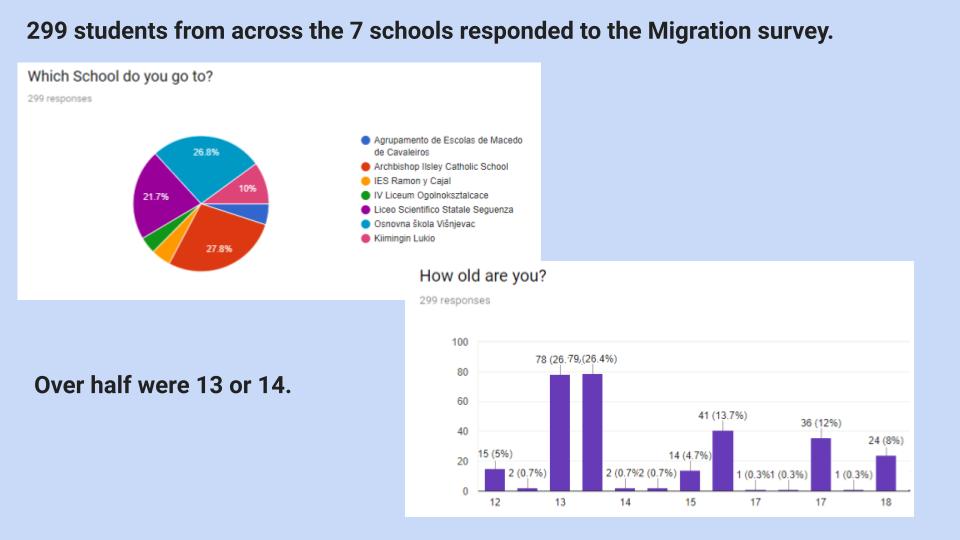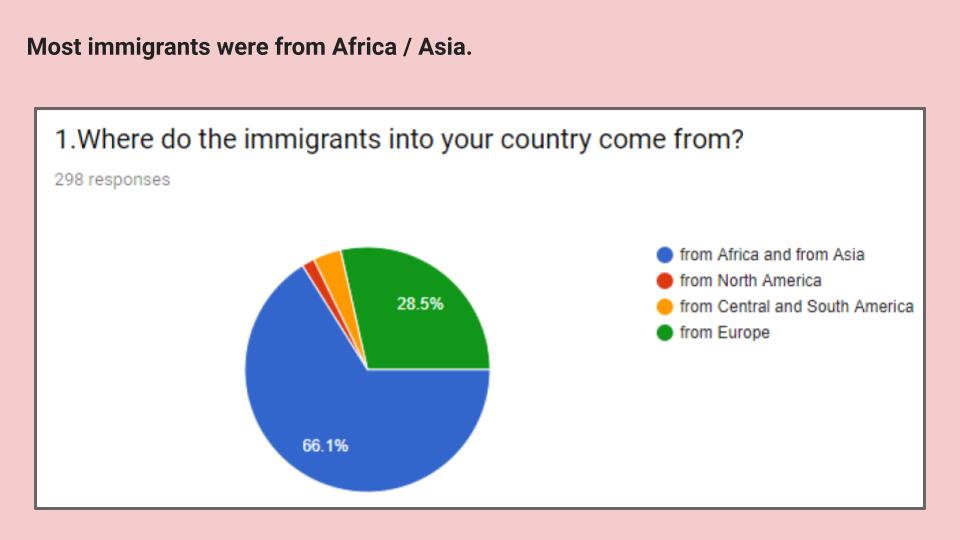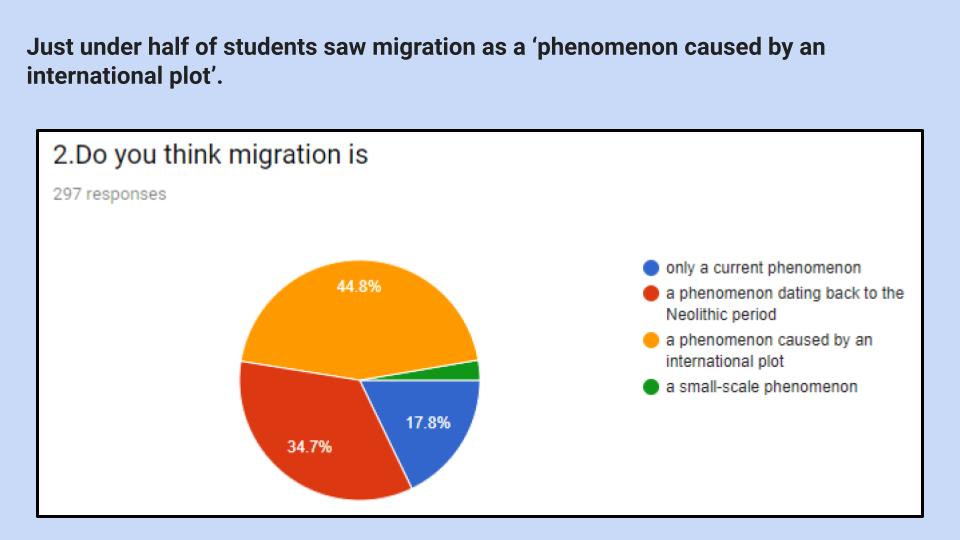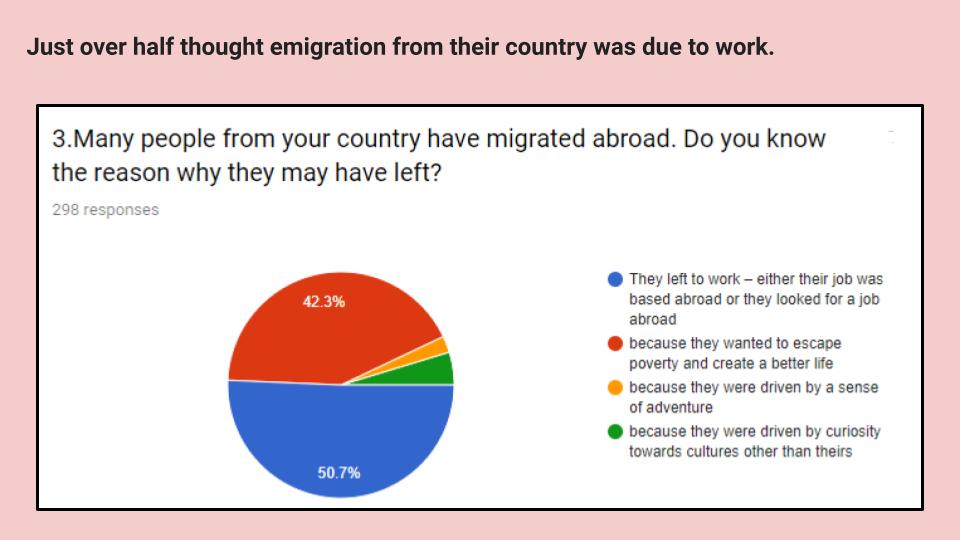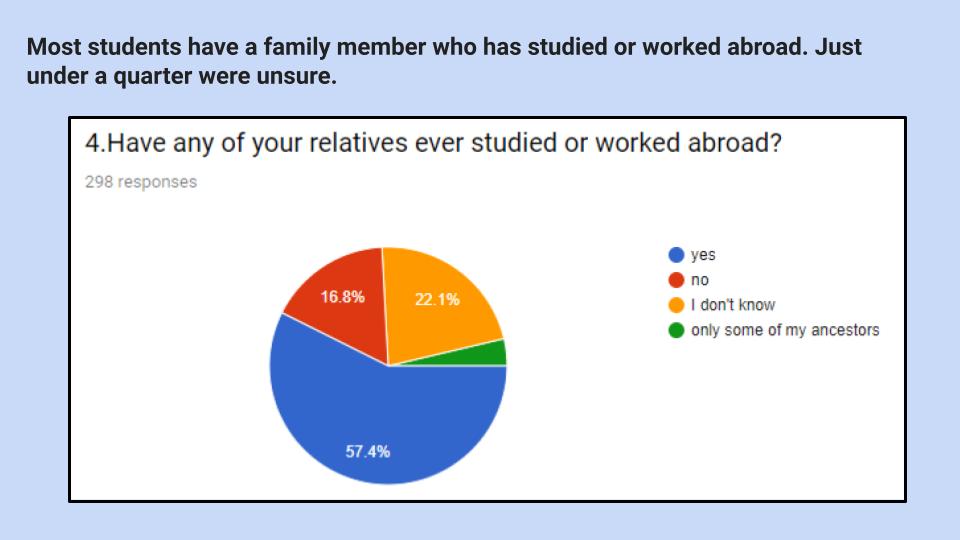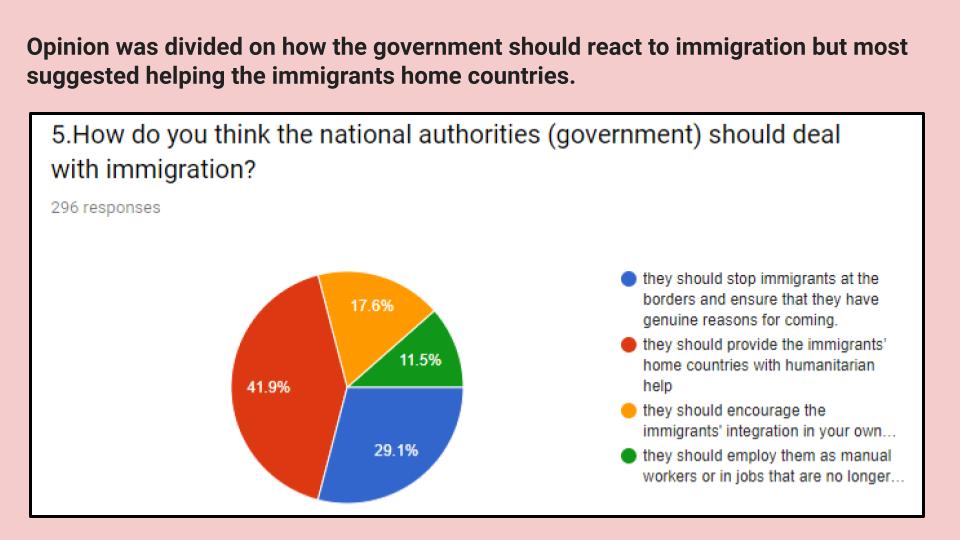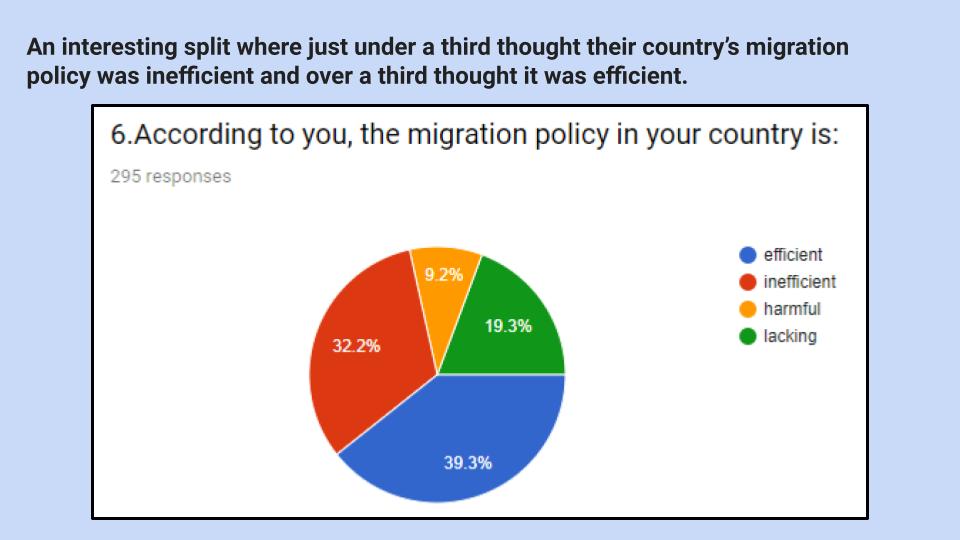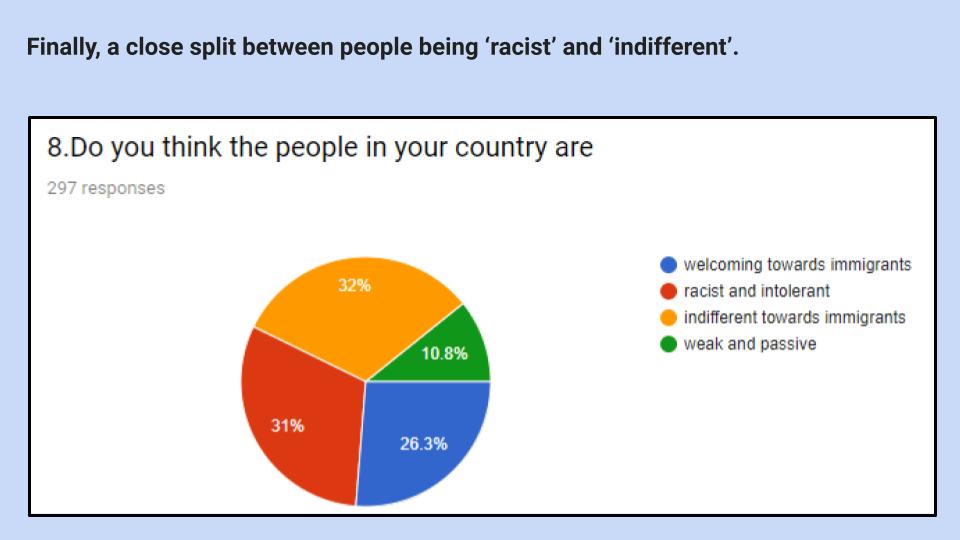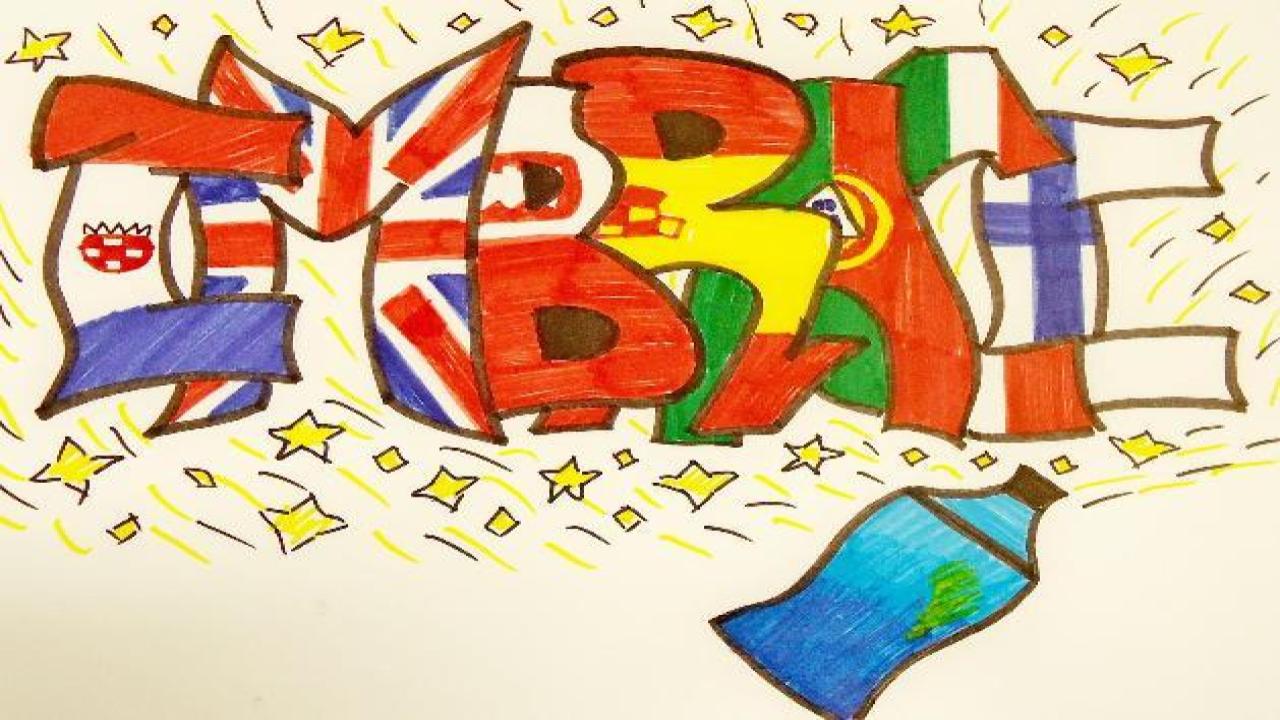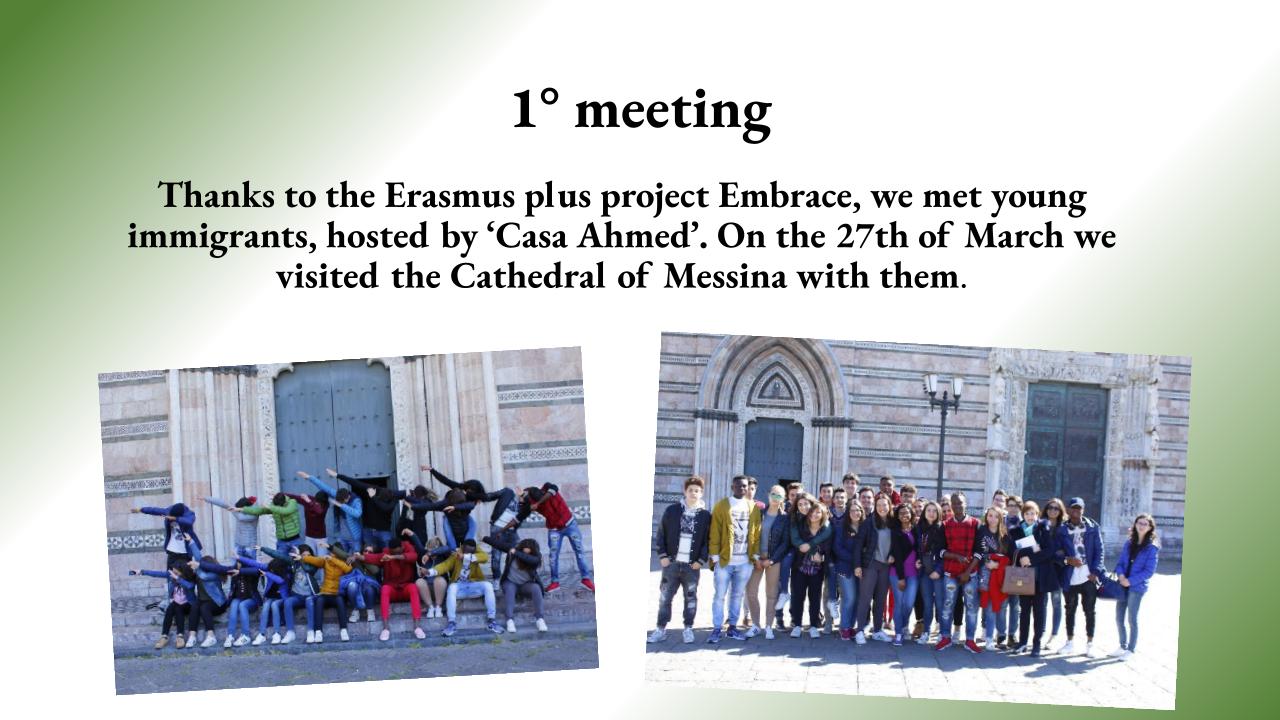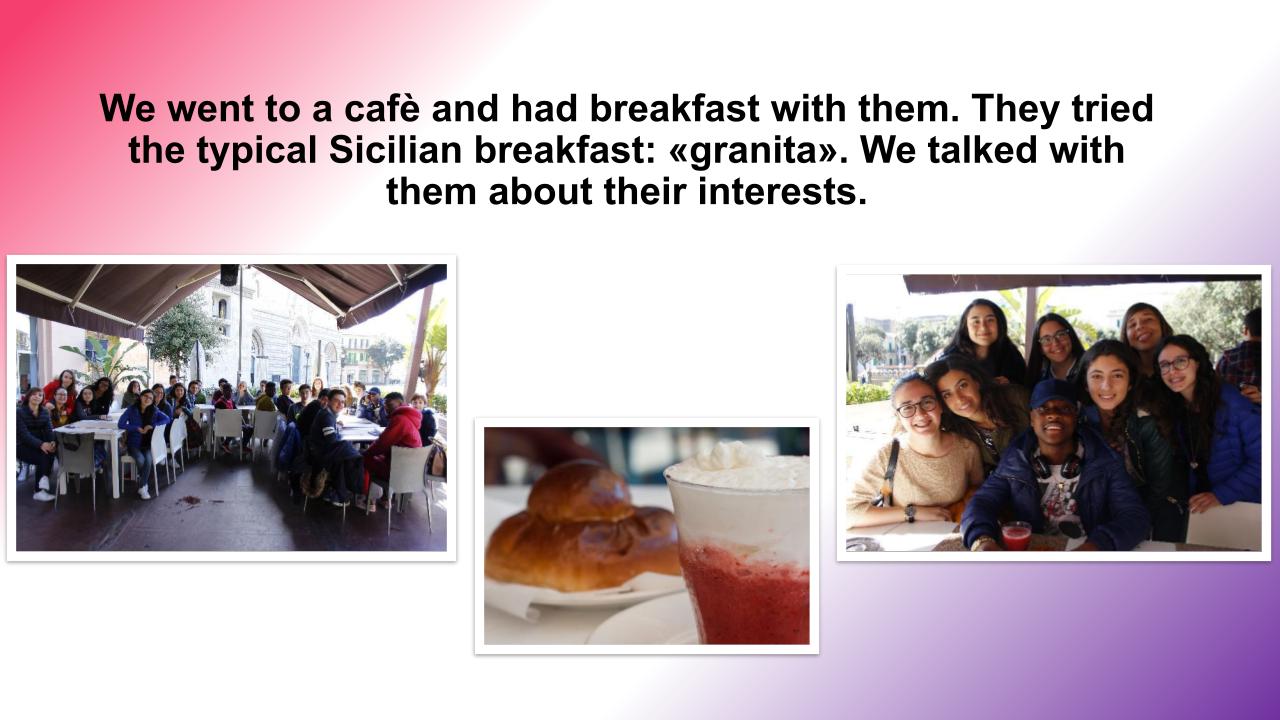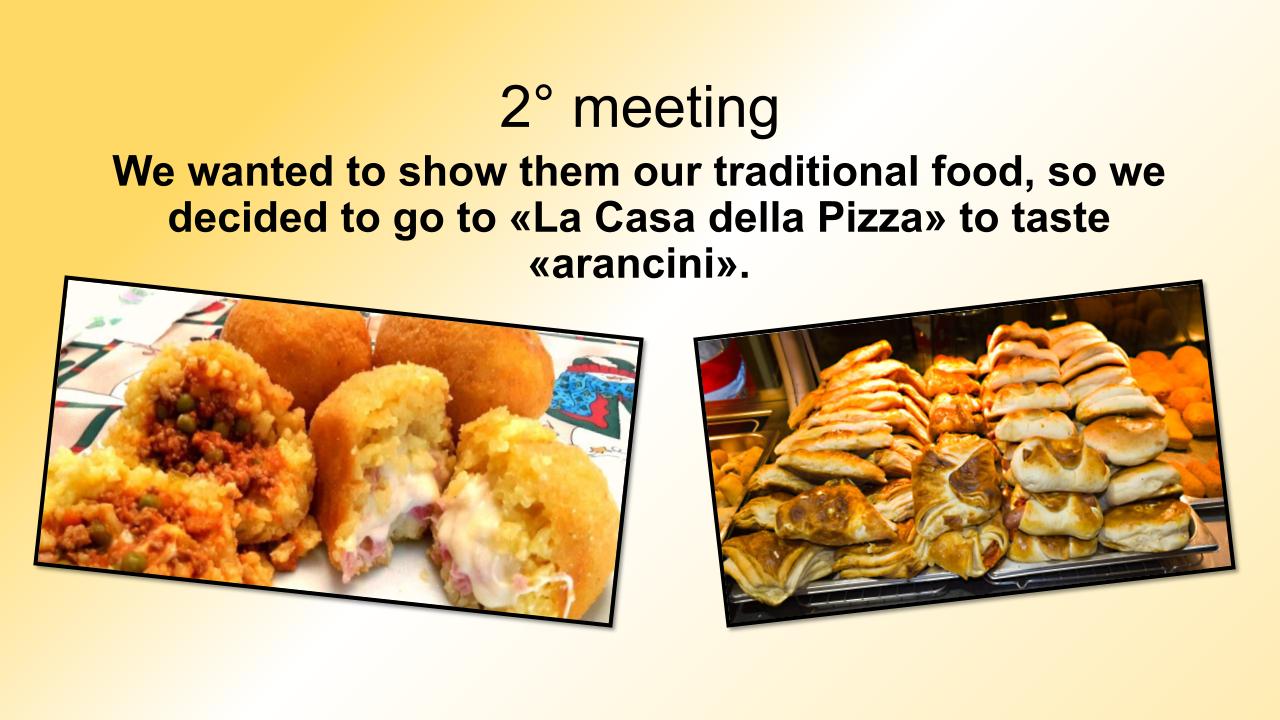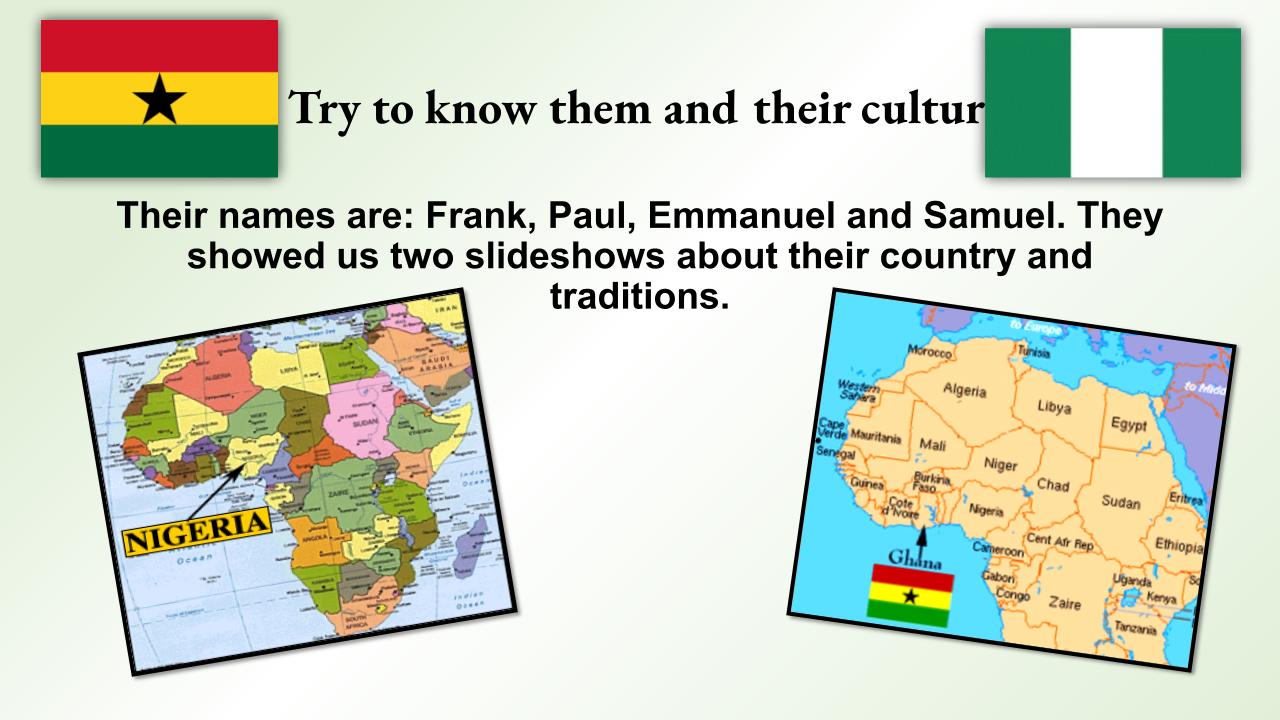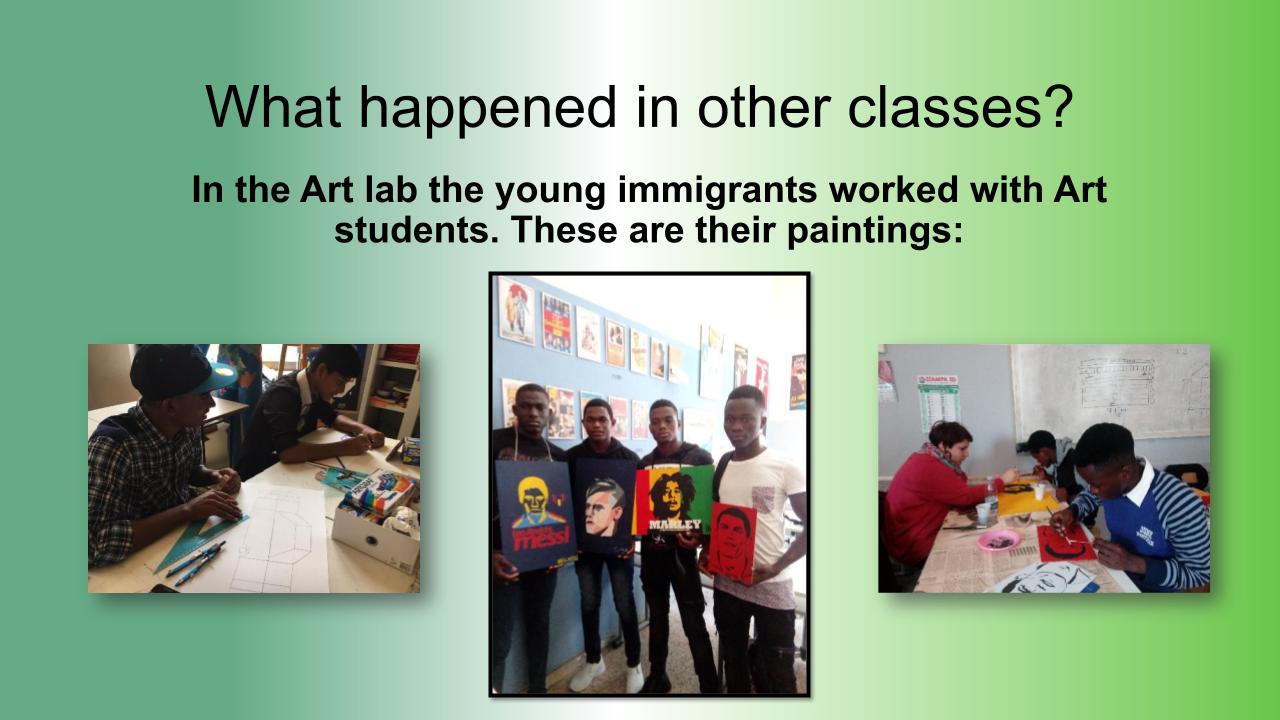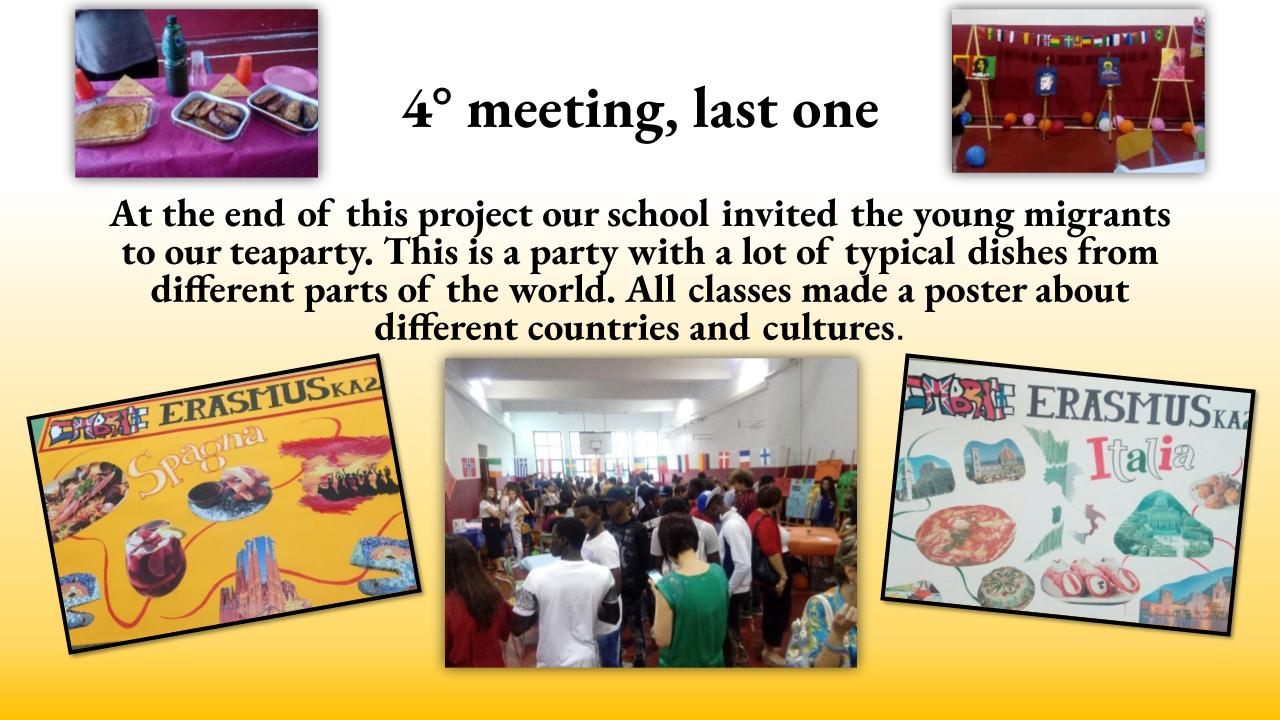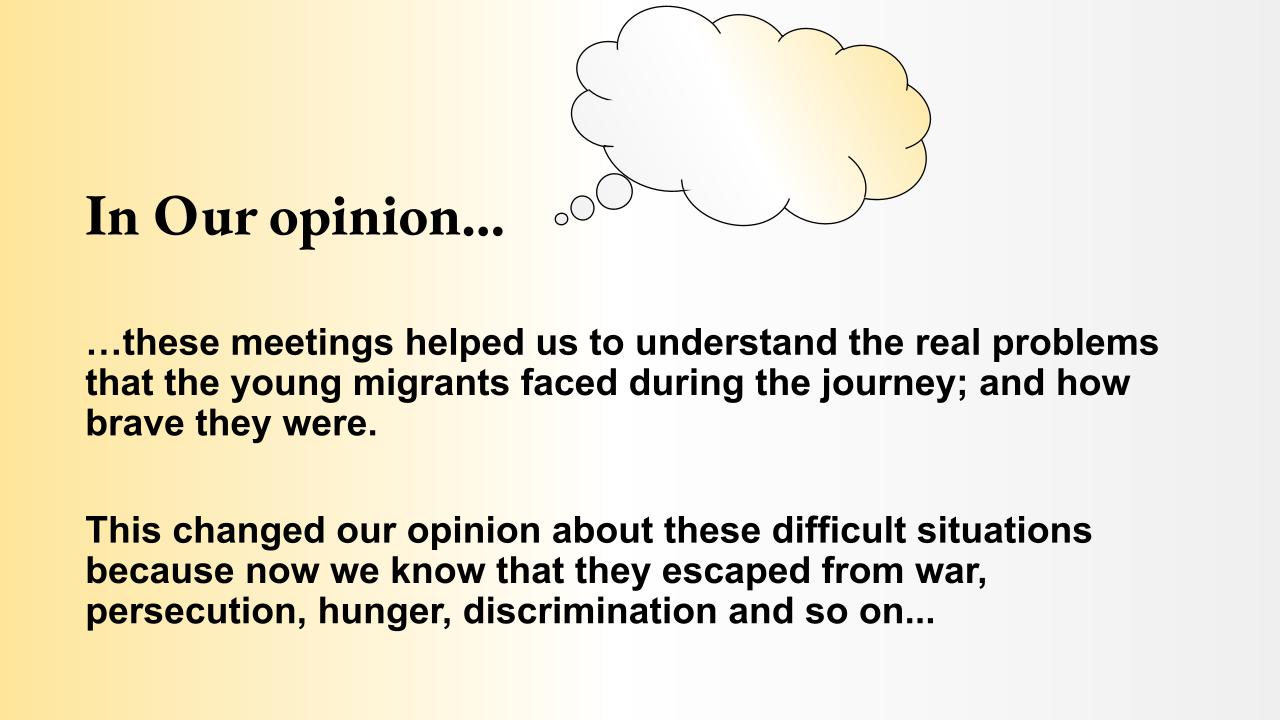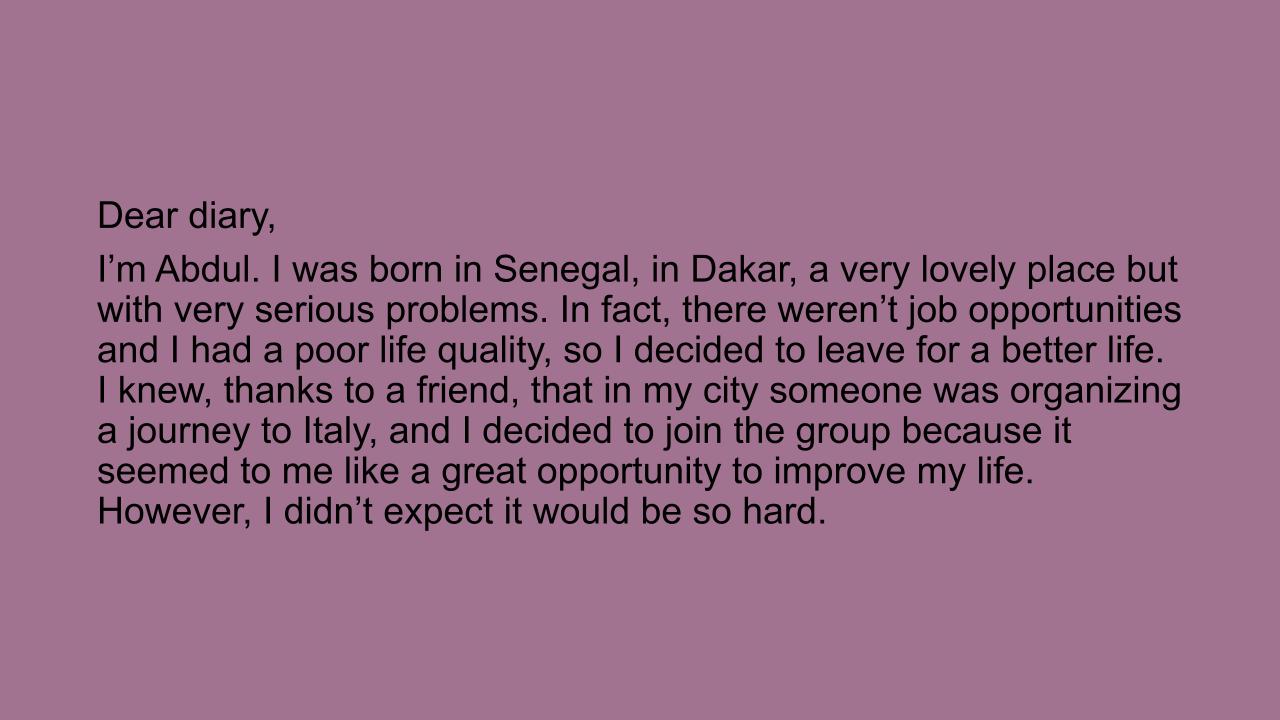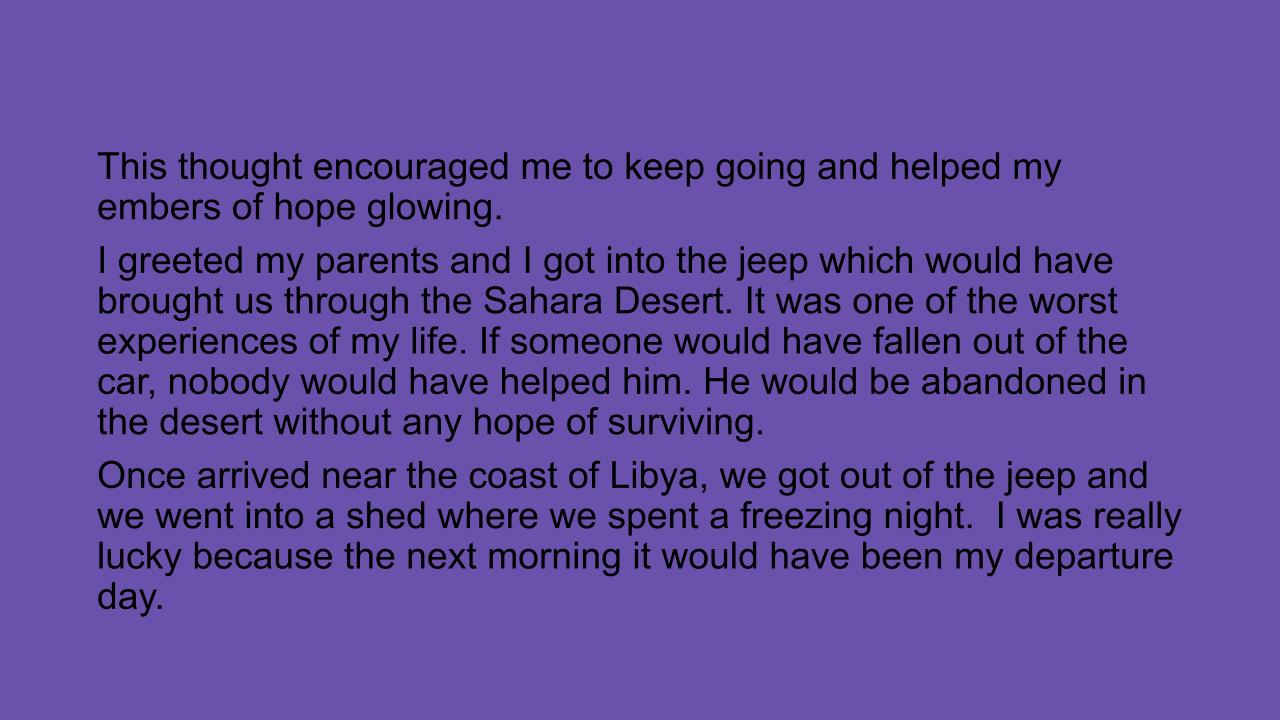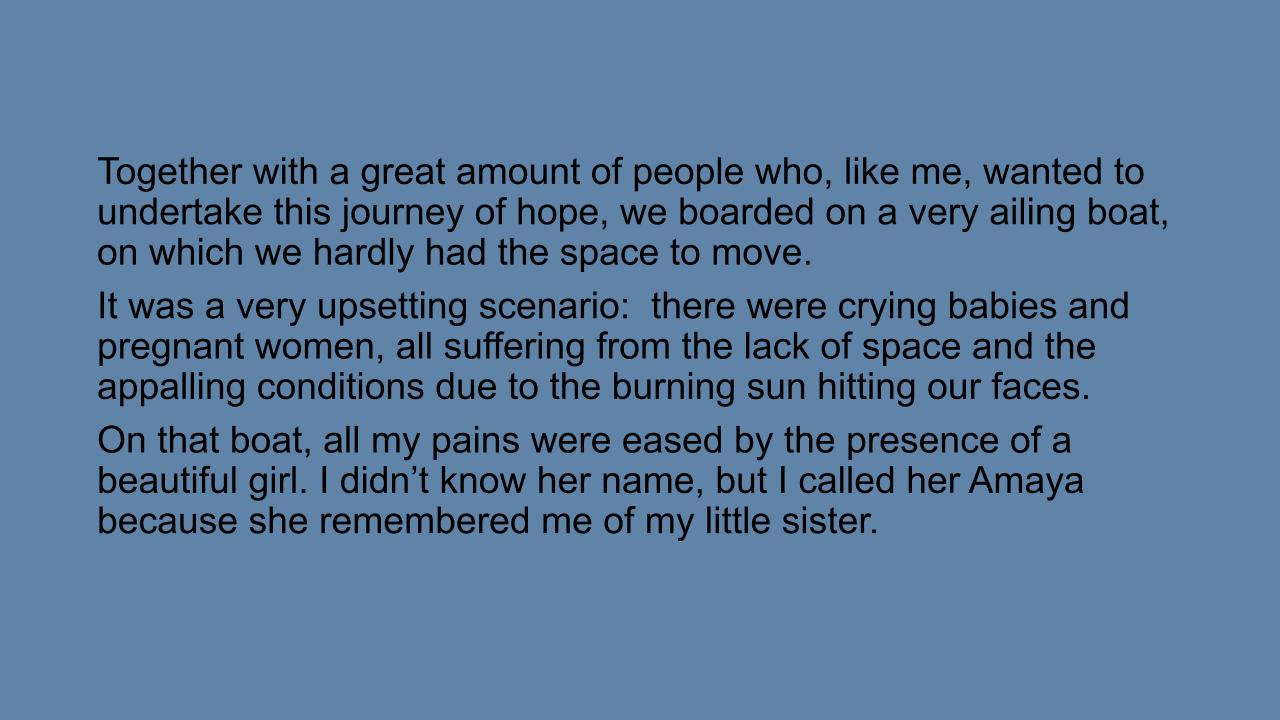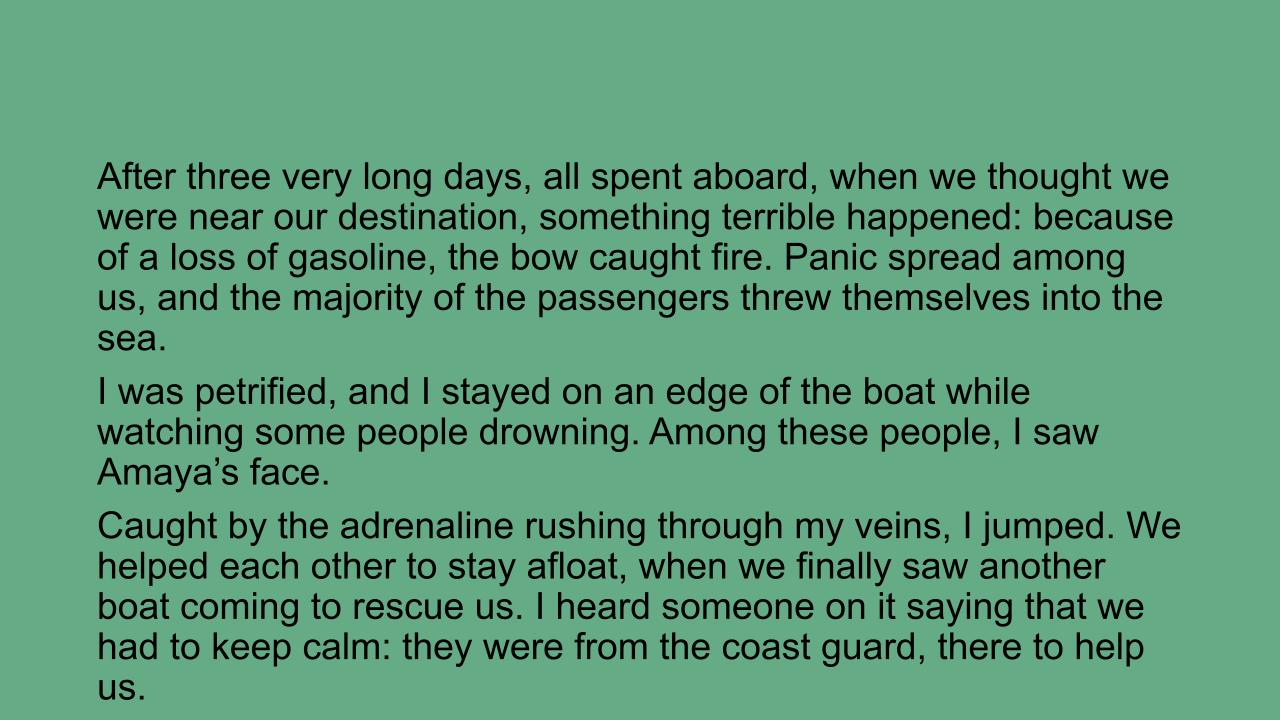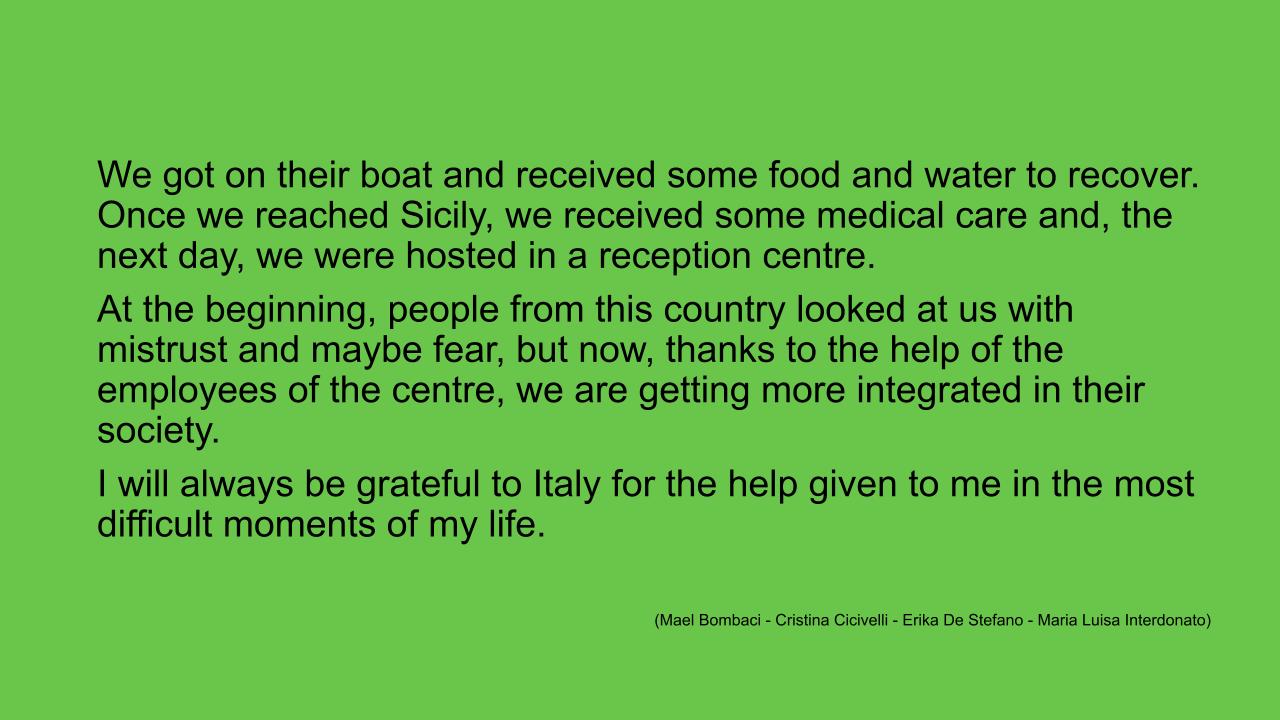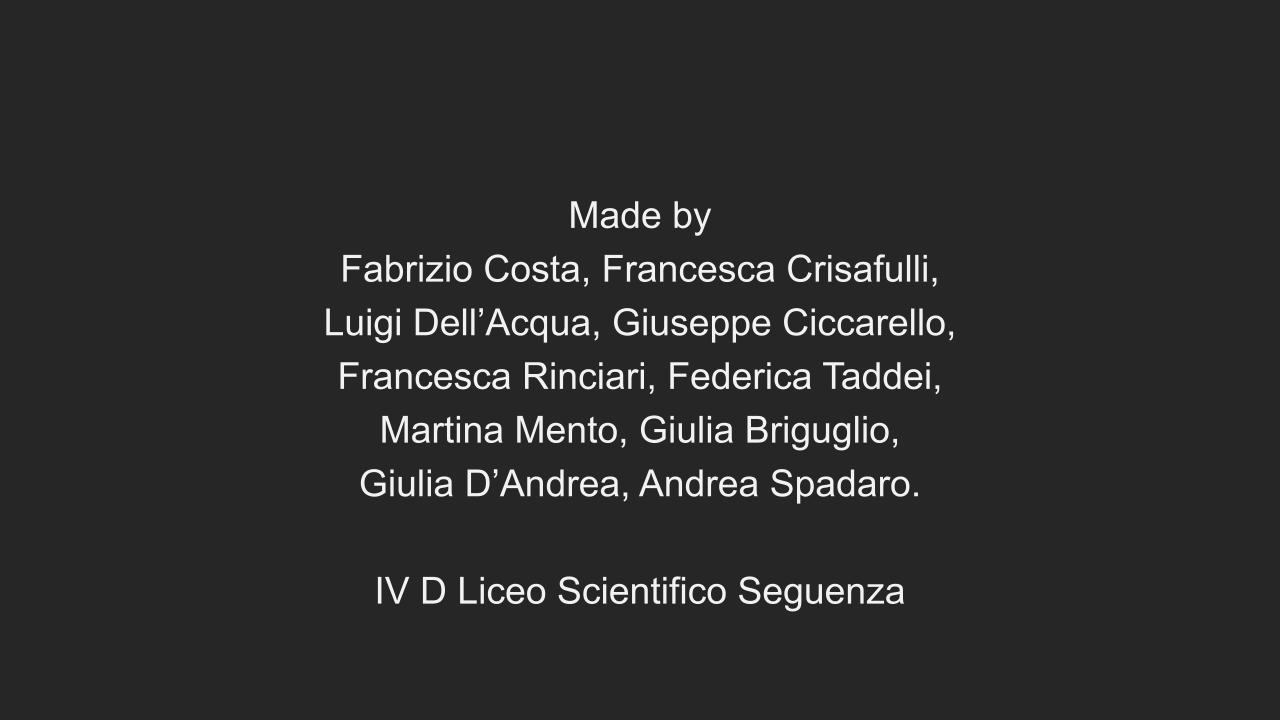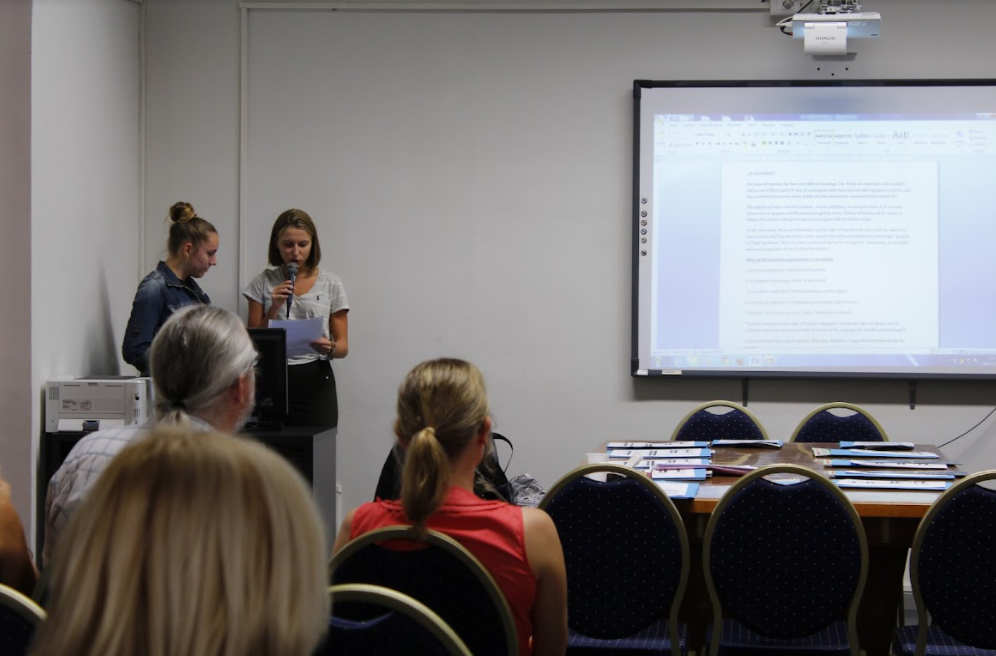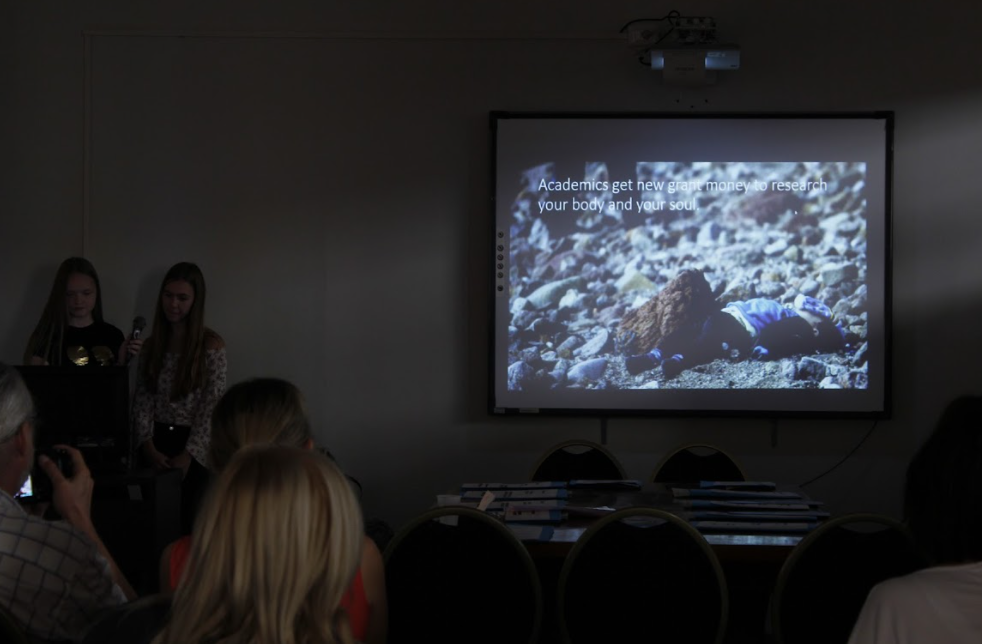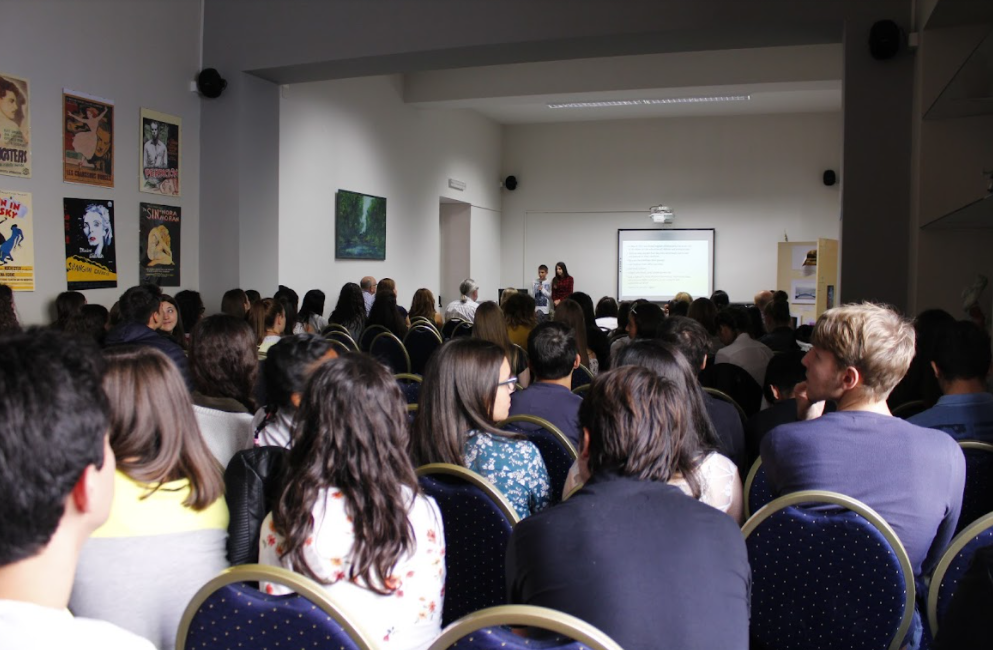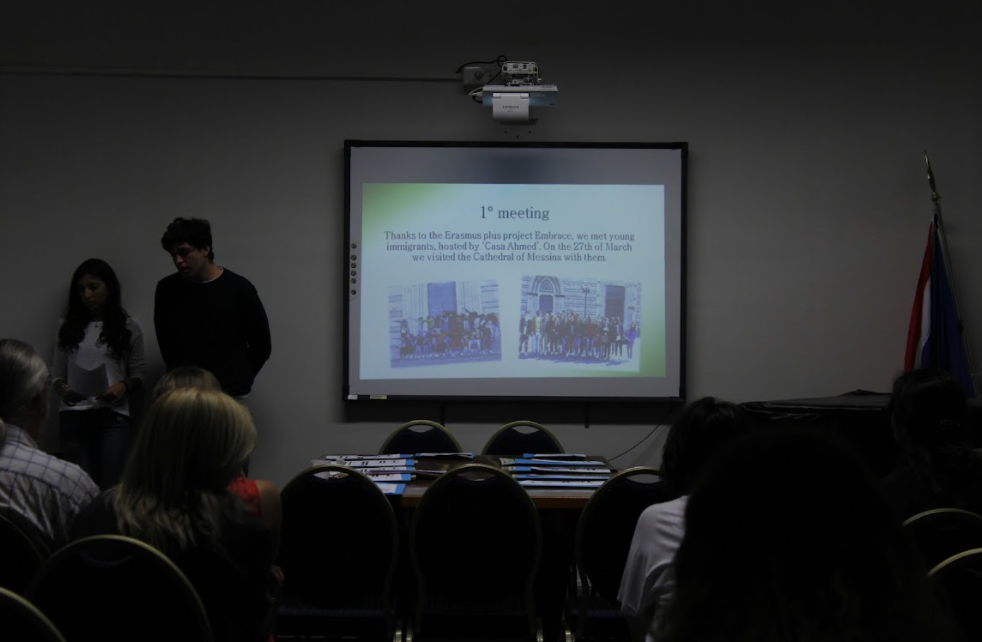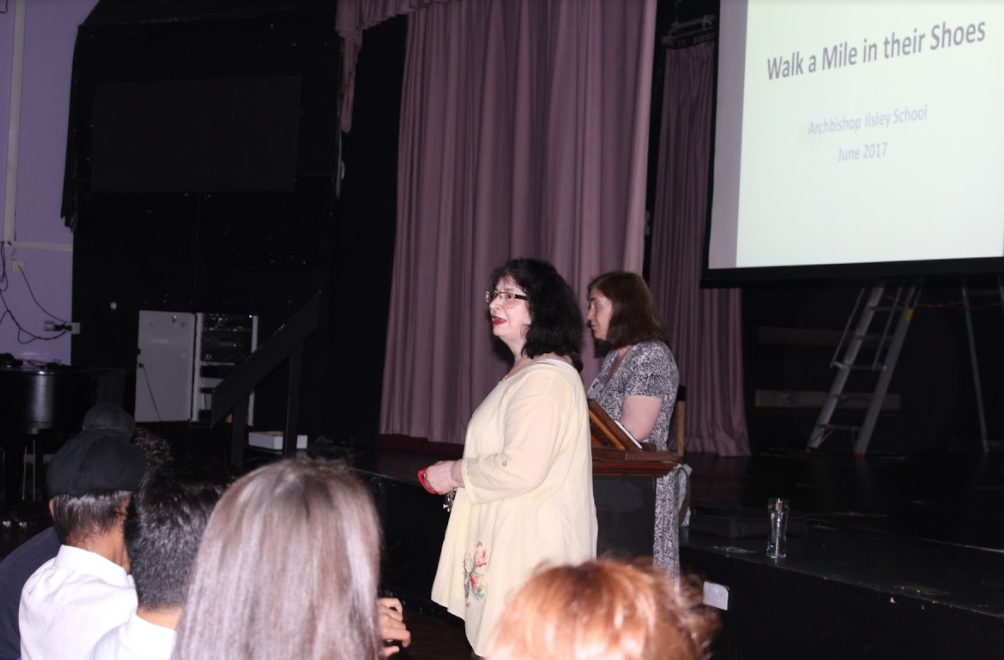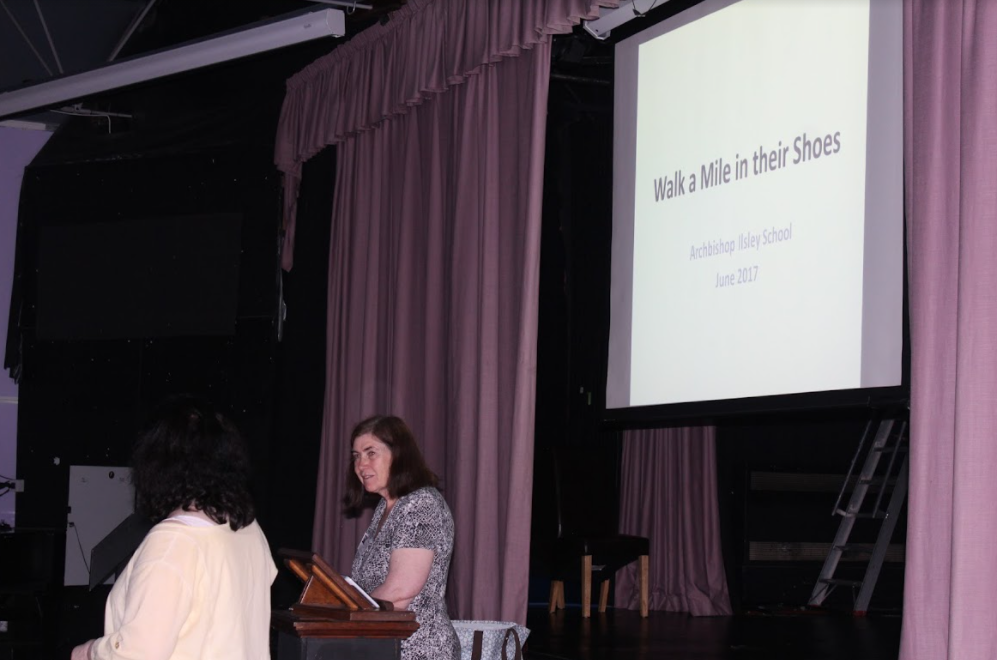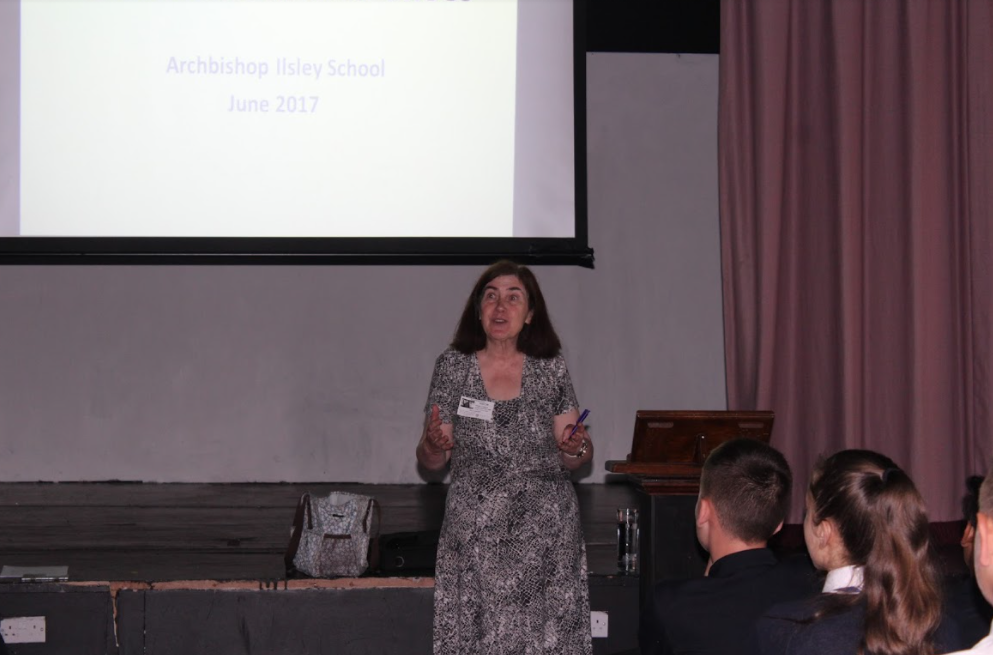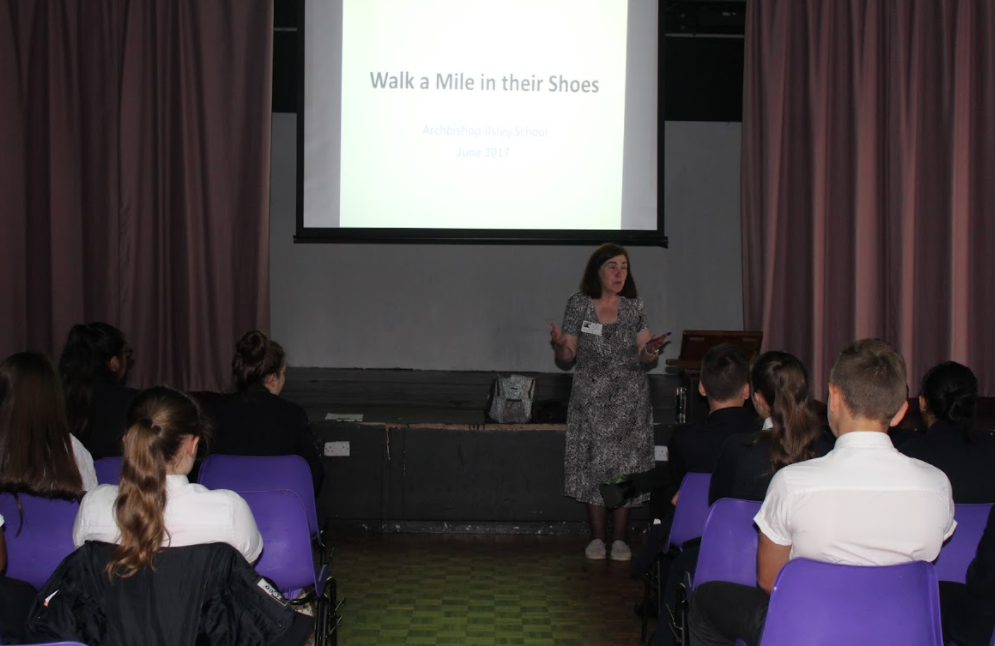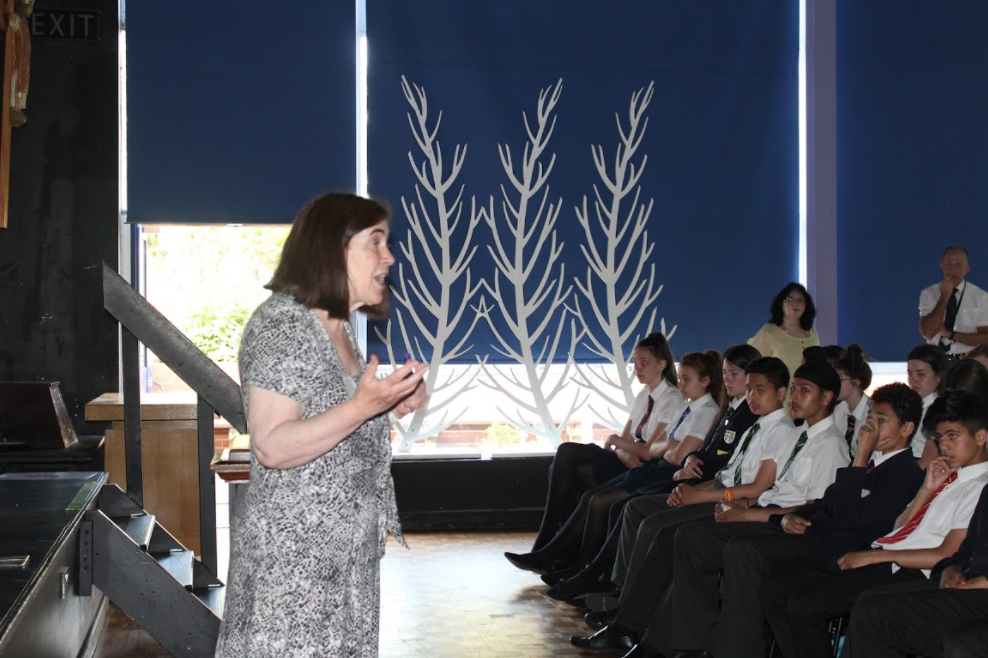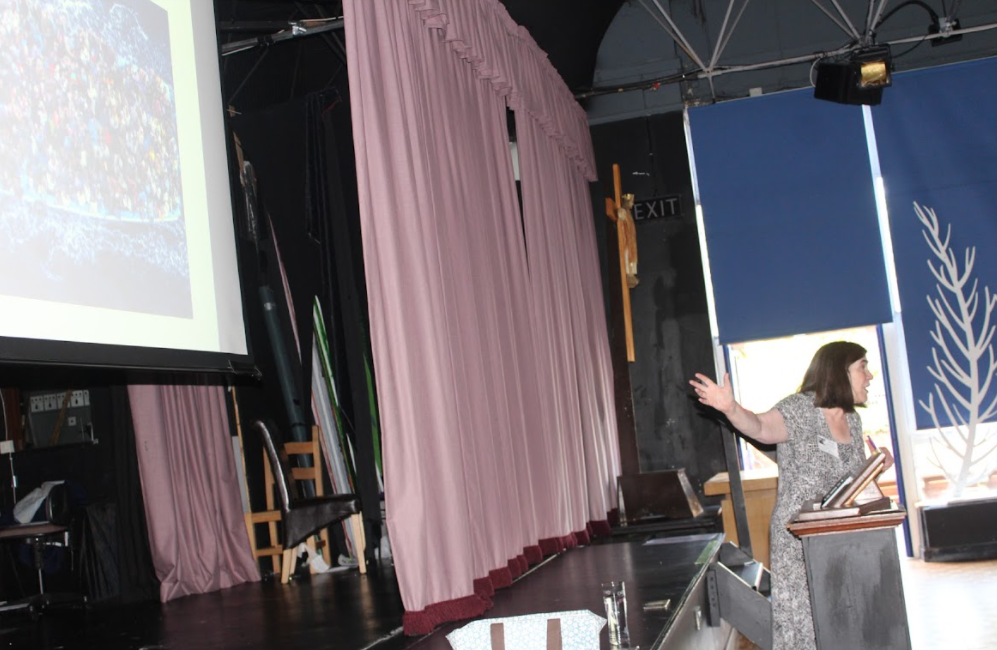In Their Shoes
This activity focused on the rising number of migrants travelling from their home countries in the past few years.
It looked at why the movement of people was happening and asked the students to consider what is was like for those having to leave their home countries.

Migration Survey
Nearly 300 students from across the seven schools involved in the EMBRACE project were asked about migration, including questions about where migrants were travelling from, why people were moving and how the government should deal with increased immigration.
The slides in the presentation show the results of each question asked in the survey and summarises the key findings on each slide.
Experience of Migrants with Casa Ahmed
The Italian team have put together a presentation about the experience of migrants with the Casa Ahmed organisation.
The students describe how the meetings they undertook helped them to further understand the problems facing young migrants.
At the end of the presentation is an extract of a migrant journey they have created.
In Their Shoes Student Presentations
The slideshow includes photographs of students from the different schools presenting their information for the 'In Their Shoes' activity.
The presenters include students from the Italian, English and Croatian schools, as well as others.
The event was hosted during the Italian mobility in October 2017.
In Their Shoes Student Task
- You must create a diary ‘In their shoes – a migrant’s story’. This could be your own story, your parents’ or grandparents or other family member.
2. Cover page with title, picture, your name
3. Terrain map(s) of the journey
4. Pictures and photos at various stages of the journey – before, during, after.
5. Text giving details of:
reasons for leaving home country; emotions / feelings?
Is there anyone with you? Who? How old?
What do you take with you and why?
mode of travel? what type of terrain/topography of the countries travelled? how long it takes;
obstacles encountered on the way and how these were overcome (weather/ terrain/ people/ financial/ sent back? );
arrival in the new land – initial feelings;
what hurdles encountered and how you/they dealt with these (differences/ people’s attitude/ financial;
how did the reality of England compare with the original expectations;
how long did it take before you/they felt ‘at home’?
Remember: There should be a minimum of 1,000 words not counting the cover or contents pages or the captions for the photos/pictures.
Students given links to useful stories:
Students encouraged to create a blog:
Brushstrokes Assembly
The slideshow to the right shows an assembly that was presented to Year 9 students at Archbishop Ilsley Catholic School.
The assembly was delivered by a representative from Brushstrokes and was titled 'Walk a Mile in their Shoes'.
Walking In Their Shoes Assembly
Assembly / Service for schools to use to introduce the Walk a Mile fundraising theme or at some time within the school year with form, year or multi-year groups.
Music on in background as students come into the room/hall:
♫ “Walk a mile in my shoes” by Coldcut (you can find it on YouTube)
Welcome the Stranger
Welcome to our Assembly where we will be reflecting on the work of Father Hudson’s Society and especially on the work of one of its projects: Brushstrokes.
At Brushstrokes Father Hudson’s Society has worked with the Infant Jesus Sisters and the parish of St Philip’s to develop support services over the last 12 years, especially for Asylum seekers and refugees. We know from the newspapers that many asylum seekers and refugees have come to Britain seeking safety, but what has their life been like here? We want to share some of their stories – stories of brave individuals and families who have come to Brushstrokes in the hope of finding a welcome.
Marie’s story
I will read part of Marie’s story – whose journey from the Congo to England was long and hard.
“I was arrested and put into prison. The prison was a huge hole in the ground; men and women together and no toilet. After about four days a guard came on duty and we recognised each other because we came from the same village. He helped me get out. I ran through the forest for several days, often over dead bodies from the war. I think this was the worst time of my life. Eventually, I got to my brother's house. We knew they would be looking for me and I was in great danger. Much later I heard that members of my family had been tortured when government people came looking for me. My brother begged and borrowed enough money to pay a people smuggler to get me out of the country. I didn't know where I was going, but we arrived at a big airport at night. He took me through the airport. I was on a forged passport as his wife.
We then went on a bus for about ten minutes. He then told me to sit on a bench while he went to buy food. I waited there all night but he never came back. I was very cold; I was wearing only a thin African dress. In the morning I tried to get people to help me but they just walked past. It was late afternoon and I was in a very bad state by now. I had been asking for help in Lingala, my language, but I then thought to speak French which I had learnt from the nuns. Eventually I found a woman who could speak French and she said she would take me to a police station. I was very frightened as in Congo the police are some of the worst people, but she said it would be alright.
I now knew I was in England. I had heard of it but knew nothing about it and not one word of English. The police gave me tea and food, but there was nowhere for me to sleep, so I sat on a chair all night. The next day they made some phone calls and said I had to go to a town called Liverpool to claim political asylum. I did not know what this was. They took me to a coach station, gave me some food and money, an address and a street map of Liverpool. We do not have street maps in Congo and I could not understand it. When I got to Liverpool I could not find the place, people would not or could not help me and I went back to the bus station after many hours and spent the night in the bus station.”
If you would like to know the rest of this story and how Marie arrived at Brushstrokes you can read her story in class.
Gospel of John Ch 4
Woman at the Well of Samaria
4 Now he had to go through Samaria. 5 So he came to a town in Samaria called Sychar, near the plot of ground Jacob had given to his son Joseph. 6 Jacob’s well was there, and Jesus, tired as he was from the journey, sat down by the well. It was about noon.
7 When a Samaritan woman came to draw water, Jesus said to her, “Will you give me a drink?” 8(His disciples had gone into the town to buy food.)
9 The Samaritan woman said to him, “You are a Jew and I am a Samaritan woman. How can you ask me for a drink?” (For Jews do not associate with Samaritans.)
10 Jesus answered her, “If you knew the gift of God and who it is that asks you for a drink, you would have asked him and he would have given you living water.”
Reflection
Jesus goes into another region, where Jews are not welcome, and he meets a woman who is hostile to him and his views and what he represents. This life changing event all begins with him needing and asking for a drink of water after a long journey.
At Brushstrokes big changes in people’s lives can come about through someone coming in need, asking for food.
Here is the story of one:
Shamina’s story
“At this point in her life, she became homeless and destitute because she was no longer entitled to housing or money for food from the UK Border Agency.
Hope Housing in Birmingham provided her with temporary accommodation while she put in a fresh claim for asylum. Shamina came to Brushstrokes for help with food during this time. The organisation provided her with weekly food parcels and a warm welcome while she continued to fight to stay in this country.
Brushstrokes was shocked to hear from her friends when they came for food parcels that Shamina was imprisoned in a detention centre where asylum seekers are held waiting to be sent home. She was waiting to be put on a plane back to her home country and her situation looked hopeless. The Officers in the detention centre told her twice to get ready to leave and twice she refused, hoping for a last minute reprieve.
Brushstrokes wrote to her MP, urging him to intervene in this case which seemed so deserving of being granted asylum. This was the only positive way for Brushstrokes to help Shamina. Two weeks after the letter was sent, Brushstrokes was amazed and delighted to see Shamina again. She had been released through the interventions of her supporters and now has the support of a barrister to fight her case to be granted leave to remain in this country.”
If you want to know how and why Shamina had to come to England you can read her story in class.
Prayer reflection
Jesus the migrant
Jesus was a migrant all his life. He said:
“Foxes have holes and birds of the air have their nests, but the Son of Man has nowhere to lay his head.”
St John tells us at the start of his Gospel:
“He came unto his own domain and his own people knew him not.”
Why was this? In what way was he different? What was it about him that made him stand out; that made some people very uncomfortable in his presence? So uncomfortable that in the end it was necessary to remove him completely, or at least that was the plan. It is possible to see what made him a target. Being different can be a dangerous place to be; as he and many migrants today have found out:
Your Gift
Just as Jesus asked the woman at the well for water we are asking you to raise funds for Father Hudson’s Society. You may decide to do this by being sponsored to walk a mile, or you may choose other ways. However you decide to do it please try to imagine what it would be like to walk a mile in their shoes: to be Marie, escaping from a prison in the Congo, finding yourself sitting on a bench, not having any idea where you are and discovering it is England. To be Shamina, no roof over your head, no money to buy food, arriving at the door of Brushstrokes – not knowing how you will be received.
Prayers
For those who suffer persecution in their own lands, that they may find a welcome here.
For those who have travelled far to reach safety, that they may find rest here.
For those whose families have been torn apart, that they may one day be reunited.
For those whose families have experienced the death of loved ones, that the Holy Spirit will comfort them.
For those whose health had been damaged, who have suffered physically and mentally, that they may find healing.
For the children, who all too young, have known the sinful side of human nature, that they may experience the loving-kindness that we are all capable of.
We will finish by listening again to the song.
Thank you for taking part today and for your support.
♫ “Walk a mile in my shoes” by Coldcut
A Reflection on the Gospel
"For I was hungry and you gave me food, I was thirsty and you gave me drink..."
Matthew 25
Matthew 25 is a wonderful place to start our Walk a Mile journey because of its loving vision of care for others. Jesus' words have such power to them because in a few simple sentences, he gives us our marching orders as Christians. How are we to live? By feeding the hungry, giving drink to the thirsty, welcoming the stranger, clothing the naked, caring for the sick and visiting those in prison.
Are we squirming yet?
I am. I can look at the list, a list given to me by Jesus and know I am falling short. I give money to various programmes to help the poor and I send cards to those who are sick. But am I really caring for them in a deeply personal way?
Does my busy-ness or my fear keep me at a distance? Closing that distance is exactly what Jesus offers us in Matthew 25.
This gospel is quite personal for Jesus as he identifies with the poor and marginalized. He doesn't say they were hungry or they were sick or unwelcome. He says, I was hungry, naked, unwelcome and in prison. Jesus fully identifies with those who are hungry and on the margins.
But those are not the words Jesus gives us. She was not a stranger and someone else welcomed her. He was not imprisoned or sick and other people visited.
Jesus is clear as he said it: I was hungry and you gave me food to eat. I was ill and you cared for me.
Dear Jesus, give us the courage to follow you more closely. Let the weeks ahead be focused on those who need our food, healing and welcome. Let us love you by loving those you put in our paths each day who need our help. Let us not hide behind the distance we want to put between those on the margins and ourselves.

